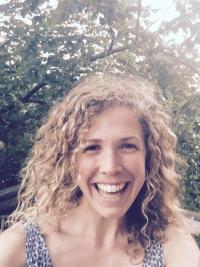Spotlight: Alice Peck, MS Alumna
Spotlight: Alice Peck, MS Alumna
 When Alice Peck came to the United States two years ago from England to work on her master’s degree in conflict analysis and resolution, she had visions of using those skills at the United Nations or at a peace-building outpost in an exotic locale.
When Alice Peck came to the United States two years ago from England to work on her master’s degree in conflict analysis and resolution, she had visions of using those skills at the United Nations or at a peace-building outpost in an exotic locale.
One afternoon on Washington, D.C.’s Metro changed all that.
“I was coming out of Union Station and was struck by all the people who are homeless right outside of the station,” she said. “And I was thinking, ‘Here I am in the capital of the world’s wealthiest, most powerful nation and yet…’
“How is this acceptable?” she wondered.
So Peck, who graduated in December with a Master of Science from George Mason University’s School for Conflict Analysis and Resolution, decided to study homelessness. She applied her conflict expertise to the subject, framing the condition as a form of “structural violence.”
“I wanted to find out how certain individuals experiencing homelessness understand and make meaning of their situation,” she said. She also wanted to understand “how their experiences relate to the broader structures of society, and the social, economic and political organization of Washington and the United States in general.”
In other words, "Alice's thesis draws attention to the ways our structuring of space can be harmful to those who live on the margins of society," said Peck's advisor Tehama Lopez Bunyasi, a professor at the School for Conflict Analysis and Resolution.
To do her study, Peck, 25, immersed herself in the world of people who are homeless. Peck, who was raised in a forest in East Sussex, educated at private schools and graduated from the University of Bristol, found herself several days a week at a therapeutic day center for the homeless in Northwest Washington, D.C. operated by the nonprofit So Others Might Eat.
She often ran the 8 a.m. meetings, helped serve meals, hosted a meditation group, played cards and assisted the 50 members typically on hand with the fussy details—such as filling out paperwork—of living in a capitalistic culture with no capital. She even took part in a protest to save a government-subsidized apartment building.
“The form of research I’m doing—ethnography—is ‘participant observation.’ You are there, and you are part of it, but just enough so that you can step back and observe and think about it from a theoretical point of view academically.”
Her blue sky dream is to “end homelessness, preserve affordable housing in the city and to find housing for all the people I am working with.” In the meantime, Peck has been offered a part-time position at the day center, where she will provide case management, operate therapeutic groups, and perform administrative work.
In the meantime, Peck has been offered a part-time position at the day center, where she will provide case management, operate therapeutic groups, and perform administrative work.
Said Lopez Bunyasi: "Alice's project has important implications for urban planning in that she is describing, among other things, the great need for the creation and protection of public space where people can simply 'be.’"
Future urban planners might consider maximizing public space where sitting down and resting cannot be criminalized as well as making available public restrooms for the fulfillment of basic needs, Lopez Bunyasi said.
Gone now for Peck, without regret, are the dreams of the United Nations or exotic outposts.
“Academically, I hope whatever I write will have some value,” Peck said. “But personally, this [experience] has profoundly changed me.”
NB. This article was originally published in University News: George Mason University on January 4, 2016
### Photo: Flickr user scribbletaylor.




